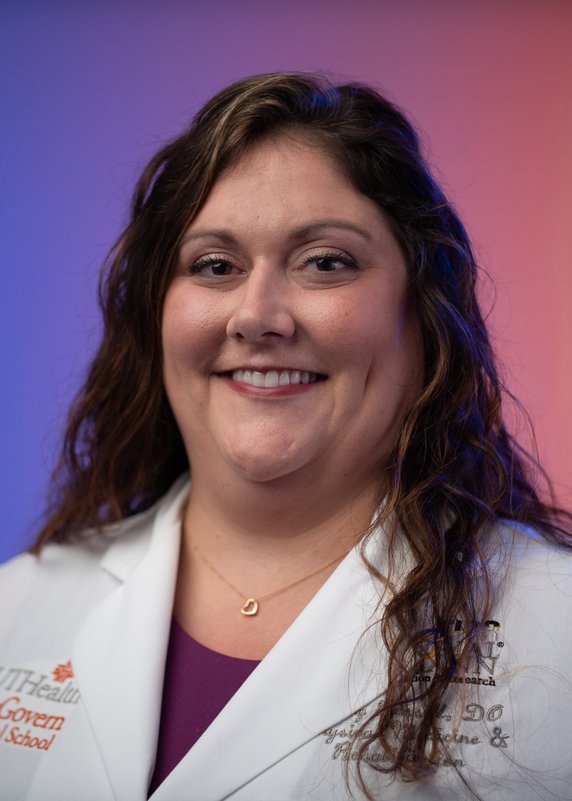.jpg)

Recovery after a stroke can look differently for each person. We still have a lot to learn about recovery and rehabilitation after a stroke, especially for those with larger strokes and those in the chronic stages of stroke recovery. UTHealth Houston Stroke Institute’s Recovery and Rehabilitation program is made up of a multidisciplinary team that offers research opportunities and clinical evaluations.
Recovery and Rehabilitation Research
The Stroke Institute is running several studies to find better ways to help stroke patients recover. This research is really important because it can lead to treatments that improve stroke survivors' quality of life.
By studying how recovery works, scientists can develop more effective therapies and interventions tailored to each patient's needs. This can help stroke survivors regain their abilities and live more independently.
We are also exploring new approaches to address the wide range of challenges faced by stroke survivors, from physical impairments to cognitive problems. This offers hope for better recovery and long-term well-being for stroke patients.
If you're interested, you can check out the institute's current studies to see if any might be a good fit for you.
-
nTVNS in Chronic Stroke
Seeking participants in a six-week research study on rehabilitation using non-invasive stimulation, called "Feasibility of Trigeminal and Vagus Nerve Stimulation in Subjects with Chronic Upper Extremity Deficits after Stroke"
We are examining the effectiveness of a novel medical device to mitigate the damage caused by stroke. In person appointments are held at the UTHealth Institute for Stroke and Cerebrovascular Diseases at 6431 Fannin, 11th Floor.
Contact:
Emily Stevens, OTR
Occupational Therapist | Research Coordinator
(713) 500-7914
[email protected]
You may be eligible if you are:
Between 40 and 80 years old
Have had a stroke 6 or more months ago
Do not have any implanted metallic electronic device
Do not have a history of seizures or migraines that is uncontrolled by medication
Participation involves:
18 sessions of outpatient rehabilitation therapy over the course of 6 weeks
Medical screenings and assessments
Electrical stimulation applied to the forehead and outer ears
If you’re unsure if you meet the requirements, call or email a member of the study team:
Emily Stevens, OTR
Occupational Therapist | Research Coordinator
(713) 500-7914
[email protected]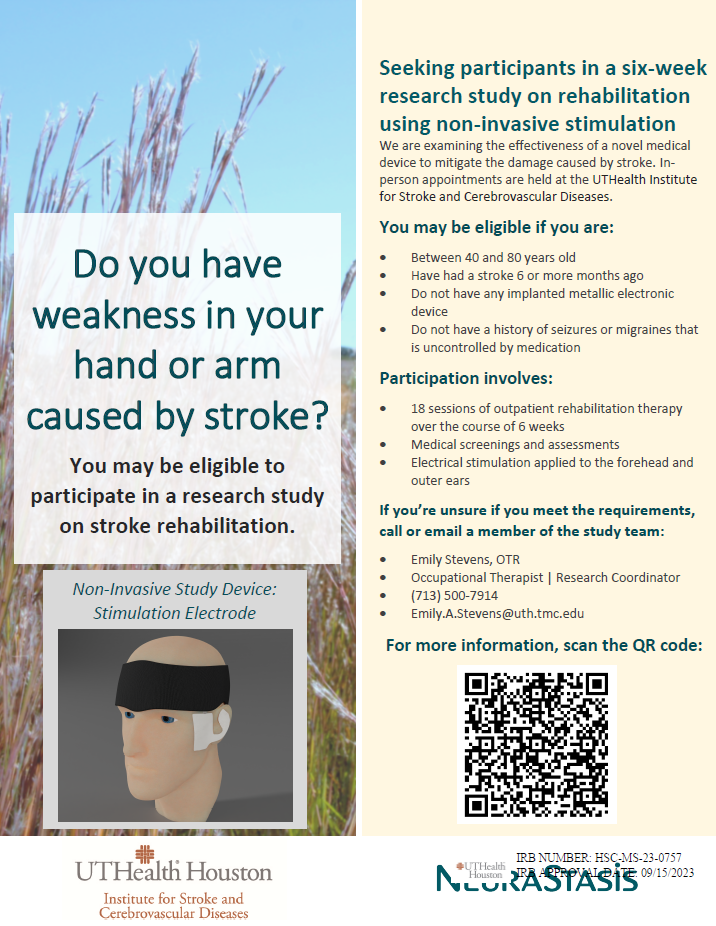
-
SUPER Patients Needed
We are looking for participants for a clinical trial addressing arm weakness after a stroke. Participants will be involved in an intensive 3-week therapy program and will have multiple assessments over a 6 month timeframe.
Meet the following criteria? Contact us!
- Age: 18-80
- At least 6 months post-stroke
- Some movement in affected arm
- Can tolerate 6 hrs therapy a day
If you’re unsure if you meet the requirements, call or email a member of the study team:
Emily Stevens, OTR
Occupational Therapist | Research Coordinator
(713) 500-7914
[email protected]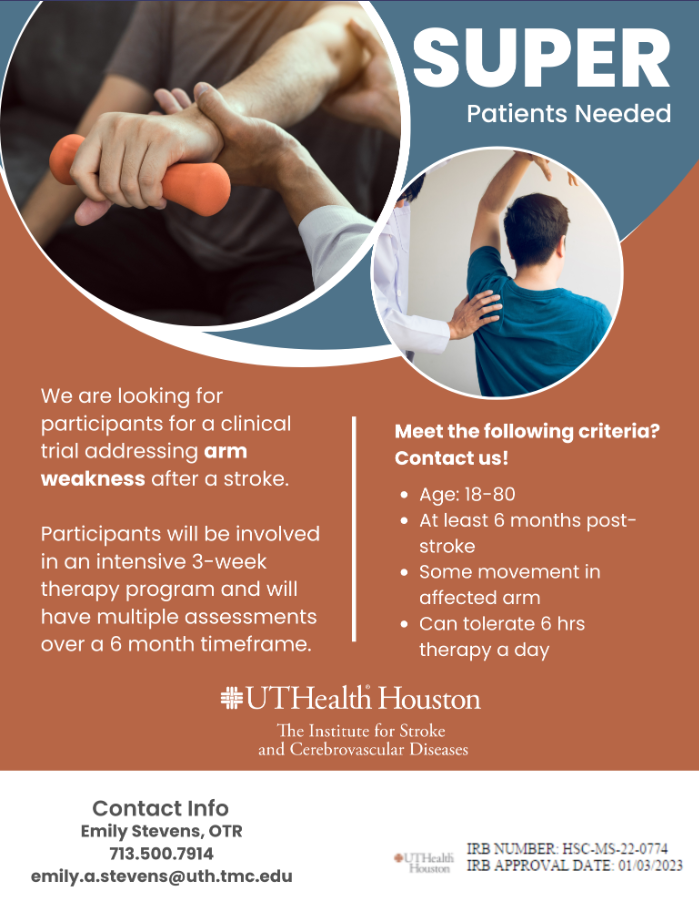
-
ARM PROGRAM
Are you a Stroke Survivor (age 18-80) with wrist and arm weakness?
Would you like to do exercises for your affected arm? UTHealth Stroke Institute is looking for patients to join a study that assesses arm movement after doing a routine exercise program.
If you’re unsure if you meet the requirements, call or email a member of the study team:
Emily Stevens, OTR
Occupational Therapist | Research Coordinator
(713) 500-7914
[email protected]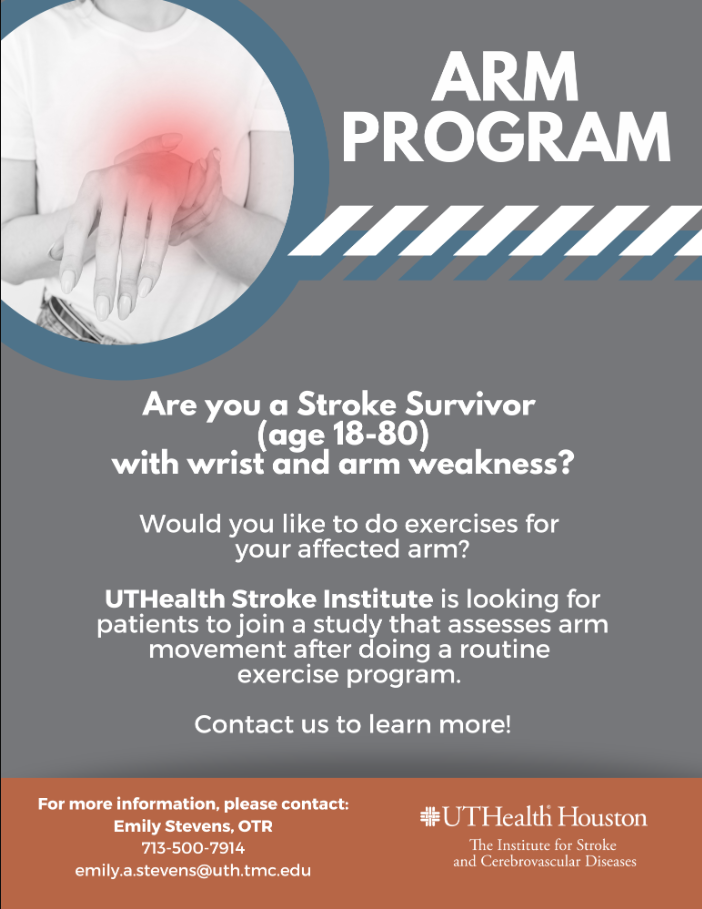
-
BIONICS
Are you a Stroke Survivor?
We’re looking for stroke survivors to enroll in BIONICS, a clinical trial using machine learning to develop tools that will make stroke recovery better.
Participants will be asked to record themselves doing a provided list of exercises. Our goal is to build a program that can be used at home to give feedback on correct arm movement during home exercise programs.
If you’re unsure if you meet the requirements, call or email a member of the study team:
Emily Stevens, OTR
Occupational Therapist | Research Coordinator
(713) 500-7914
[email protected]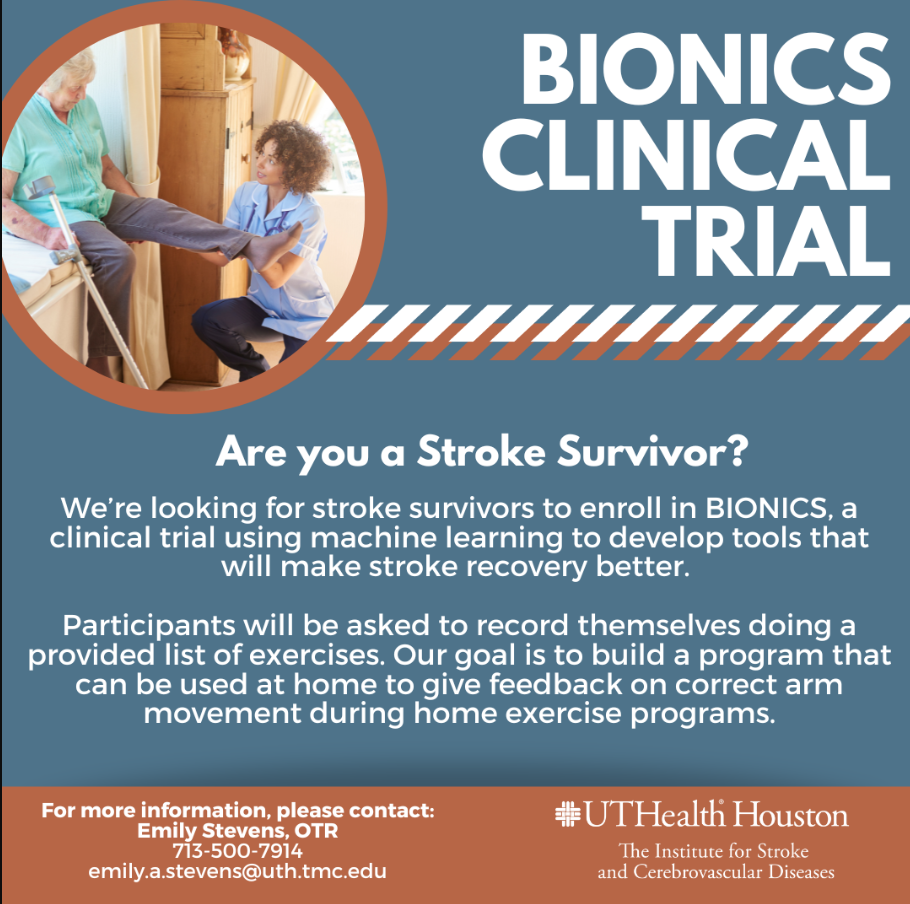
-
TRANSPORT-2
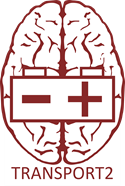
The Institute for Stroke and Cerebrovascular Disease at UTHealth is looking for patients to enroll in TRANSPORT2, a clinical trial evaluating the efficacy of 2mA or 4mA doses of transcranial Direct Current Stimulation (tDCs) in combination with modified Constraint Induced Movement Therapy (mCIMT) on upper limb impairment after ischemic stroke.
Help us by referring qualified patients who match the following eligibility criteria:- Between the age of 18 and 80 years old
- First-ever ischemic stroke that occurred in the last 6 months
- Experienced one-sided arm weakness as a result of the stroke
- Have NOT received injections for spasticity in the last 3 months
- Does not have a history of seizures (isolated febrile childhood seizures may be ok)
Have a patient matching the above criteria?Refer them to Emily Stevens at 713-500-7914 or [email protected]
For more information on TRANSPORT2, please visit their website
Stroke Recovery Clinic
The stroke recovery clinic occurs once a month. In this clinic, our multidisciplinary team provides an extensive evaluation of a stroke survivor and offers recommendations and referrals for their recovery. To learn more about how you can participate, contact:
Emily Stevens, OTR, MOT, CSRS
Research Occupational Therapist | Certified Stroke Rehabilitation Specialist | Lead, Motor Recovery Trials
(713) 500-7914
[email protected]
Recovery and Rehabilitation
.jpg)

Director, Institute for Stroke and Cerebrovascular Disease
UTHealth Houston
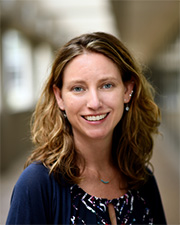

UTHealth Houston Institute for Stroke and Cerebrovascular Diseases
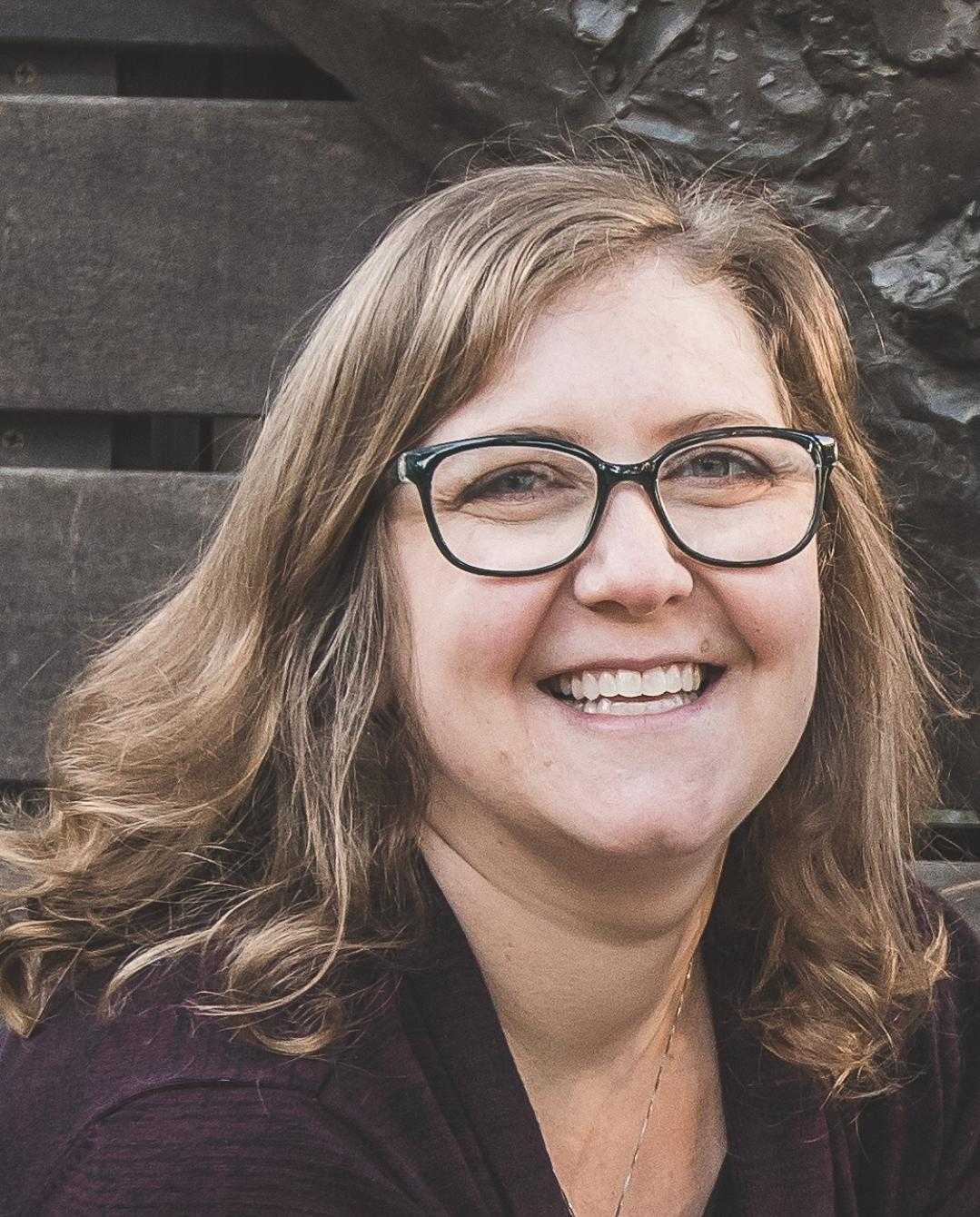
Certified Stroke Rehabilitation Specialist, Lead, Motor Recovery Trials
UTHealth Houston Institute for Stroke and Cerebrovascular Diseases
AI Powered Mobile App
We have developed a mobile app that meticulously measures each patient’s prescribed rehab exercise, counting repetition, monitoring speed, and assessing quality with precision. Patients receive real-time instruction and feedback, ensuring each exercise is performed accurately and effectively. This seamless integration of technology fosters an enhanced recovery process, keeping both healthcare providers and patients in sync every step of the way.
The app is a collaborative effort between the Institute for Stroke and Cerebrovascular Diseases and the McWilliams School of Biomedical Informatics including:
- Kaichen Tang
- Mark B Jones
- Jean C Rodriguez Valero
- Emily A. Stevens, OTR, MOT, CSRS
- Shayan Shams, PhD
- Xiaoqian Jiang, PhD
- Sean I Savitz, MD
Our aspiration is to make this transformative tool available on the iOS App Marketplace, extending its reach to countless individuals embarking on the stroke recovery journey.
